The Reception of Jane Eyre in Victorian England
The publication of Jane Eyre in 1847 marked a significant moment in literature and society. Charlotte Brontë’s work sparked conversation and debate, reflecting prevailing attitudes toward gender, class, and morality in Victorian England. Understanding how the novel was received allows us to delve into the complexities of its themes and the societal norms of the time.
Responses from Critics and Readers
When Jane Eyre first appeared, it generated a mix of admiration and criticism. Many contemporary reviewers praised Brontë’s bold narrative style and strong character development, especially regarding the titular character, Jane. Critics like George Henry Lewes celebrated her ability to portray the emotional depth of her protagonist, while others were taken aback by the novel’s Gothic elements and social commentary. Some critics even suggested that Brontë’s writing bordered on the immoral, clashing with the Victorian emphasis on decorum and propriety. This blend of accolades and discontent highlighted the novel’s controversial stance in its exploration of female independence and moral complexity.
Impact on Feminism and Social Norms
Jane Eyre resonated deeply with emerging feminist sentiments in the 19th century. The character of Jane, who fiercely asserts her need for autonomy and self-respect, captured the imagination of many readers, especially women. Her struggles against societal constraints paralleled the real-life struggles women faced during that era, influencing discussions about women’s rights and education. Readers found inspiration in Jane’s journey toward self-definition and independence, making the novel a subtle yet powerful vehicle for social change. However, while some applauded the feminist undertones, others were concerned about the novel’s challenge to traditional gender roles, reflecting the tension between progress and conservatism in Victorian society.
Commercial Success and Longevity
From its initial release, Jane Eyre enjoyed considerable commercial success. The book was well-received among various social classes, bringing readers together through its universal themes. The novel’s popularity paved the way for Charlotte Brontë to establish herself as a prominent author in literary circles. Over the years, public interest has only grown, making Jane Eyre a staple in literature classes and adaptations for theater and film. Its enduring appeal showcases the timelessness of its themes and characters, ensuring that Brontë’s work continues to provoke thought and discussion more than 170 years later.
In conclusion, the reception of Jane Eyre provides valuable insights into Victorian values and debates. The novel remains relevant as it challenges us to consider issues of identity, autonomy, and social justice. To explore more about this fascinating work and its impact on literature and society, dive into the novel itself or seek out modern interpretations that keep Brontë’s legacy alive.
